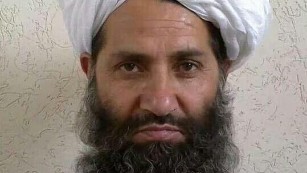
The Afghan Taliban’s new leader is an educated and well-respected member of the organization who could prove easier to negotiate a peace settlement with, a founding member of the group tells CNN.
Mawlawi Haibatullah Akhunzada, named the new Afghan Taliban leader following the death of Mullah Akhtar Mohammad Mansour, is in his late 50s and comes from Panjwai district of southern Kandahar province, according to Sayed Mohammad Akbar Agha.
While he was involved in the mujahedeen struggle against the Soviet invasion in the 1980s, Agha says the new leader is unlikely to have participated in frontline military activities.
He did judicial work between 1996 and 2001, during the Taliban’s ruling period in Afghanistan, and following the group’s fall from power in late 2001 he worked as Taliban Chief Justice, according to Agha who lives in Kabul and says he knows the new leader.
He became then-leader Mullah Akhtar Mohammad Mansour’s deputy when he succeeded Mullah Omar.
Mullah Omar’s son promoted
“The Islamic Emirate’s leadership council… decided to appoint Mawlawi Haibatullah Akhunzada as the new leader of the Islamic Emirate and Mawlawi Sirajuddin Haqqani and Mawlawi Mohammad Yaqoob as his deputies,” a Taliban statement announcing the appointment reads.
Haqqani is the leader of Haqqani terror network, long aligned with the Taliban and al Qaeda, and Yaqoob the son of former long-time Taliban leader Mullah Mohammed Omar.
Haqqani, who has a $10 million State Department bounty on his head, heads a wide-ranging family-based network based primarily in North Waziristan, Pakistan. It held captured U.S. soldier Bowe Bergdahl before he was repatriated in a prisoner swap.
Taliban claim Kabul bombing/
Meanwhile, 10 people were killed and four others injured Wednesday morning when a suicide bomber detonated explosives in Kabul, Najib Danish, a deputy spokesman for the Afghan Interior Ministry tells CNN. Two children are among the injured.
The attack targeted a vehicle carrying court employees of neighboring Wardak Province, according to Danish.
The Taliban claimed responsibility for the attack, the group said in a statement.
Pledge of allegiance
“All the members of the leadership council pledged allegiance to the newly appointed leader,” the statement continues, allegiance to the new leader is “a religious obligation,” it said.
The same statement confirmed the death of the previous leader, who was killed in a U.S. drone strike in Pakistan’s Balochistan province Saturday. It called on “all Muslims” to enter a three-day period of mourning for Mansour.
The Taliban had previously confirmed Mansour’s death to CNN but today’s announcement is the first public statement from the group to affirm the death. U.S. and Afghan intelligence agencies had also independently confirmed his death.
Ahmed Rashid, author of five books on the Taliban and the region, said that the new leader is a religious scholar, rather than a soldier or a politician, and it is hoped that his appointment would herald a return to a more consensus form of leadership within the militant group.
“The new leader is neither a political figure nor a military figure but is known and respected for jurisprudence and legal decision he is bound to reach out to others in the shura to discuss all issues,” he told CNN, referring to the Taliban’s leadership council.
“His position on talks with the Kabul government is not known, nor are any of (his) political inclinations because he has been setting the standards for legality and making sure that sharia Islamic law was being properly followed.”
Leadership targeted
Mansour inherited the leadership from leader Omar, who died in Pakistan in 2013. Omar had held the position since the inception of the movement in 1994.
The new leader worked closely with Mansour, according to Michael Semple, professor at the institute for the study of conflict transformation at Queen’s University Belfast.
“He is a senior cleric and was the author of many of the decrees that Mansour used to provide religious cover for his actions,” Semple says.
Pakistan voiced objections over Mansour’s assassination, stating that the strike was a violation of its sovereignty.
The new leader will inherit the same challenges that faced Mansour, Semple wrote ahead of Akhunzada’s appointment.
“The first thing (the new leader) will have to do is convince the rest of the movement of his legitimacy,” he said.
As reported by CNN
